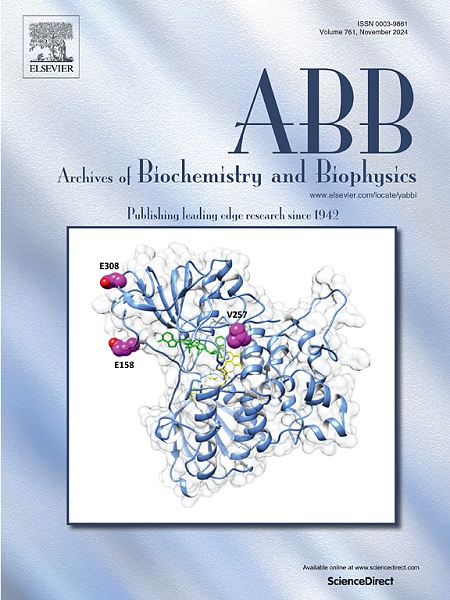UCP2 attenuates neural apoptosis and inflammation in spinal cord injury by inducing the acetylation of ANXA1 and activating the PI3K/AKT pathway
IF 3.8
3区 生物学
Q2 BIOCHEMISTRY & MOLECULAR BIOLOGY
引用次数: 0
Abstract
Spinal cord injury (SCI) represents a prevalent form of mechanical trauma, frequently resulting in significant disability and mortality. Uncoupling protein 2 (UCP2) has been recognized for its neuroprotective properties; however, its specific role in SCI remains to be elucidated. This study aims to investigate the neuroprotective effects of UCP2 in the context of SCI and to further explore its downstream mechanisms of action. Through in vitro experiments, we demonstrated that UCP2 overexpression significantly improved cell viability and inhibited apoptosis and inflammatory responses in the lipopolysaccharides (LPS)-induced SCI cell model. Results of animal experiments showed that adeno-associated virus-mediated overexpression of UCP2 contributed to the recovery of SCI-afflicted rats, evidenced by improved Basso, Beattie, and Bresnahan scores, decreased water content in spinal tissues, reduced number of apoptotic cells in spinal cord. Mechanistic investigations revealed that UCP2 directly interacts with annexin A1 (ANXA1), enhancing its protein stability through acetylation at the K58 site. Furthermore, UCP2 was found to activate the phosphoinositide 3-kinase (PI3K)/protein kinase B (AKT) signaling pathway by upregulating ANXA1 expression. Rescue assays indicated that knockdown of ANXA1 or inactivation of the PI3K/AKT pathway by LY294002 treatment partially neutralized the protective effects of UCP2 overexpression against apoptosis and inflammatory responses in LPS-stimulated BV-2 cells. Taken together, this study concludes that UCP2 ameliorates apoptosis and inflammatory responses in the SCI model by modulating acetylation-mediated protein stabilization of ANXA1 and activating the PI3K/AKT pathway.

UCP2通过诱导ANXA1乙酰化和激活PI3K/AKT通路,减轻脊髓损伤中的神经凋亡和炎症。
脊髓损伤(SCI)是一种常见的机械损伤形式,经常导致严重的残疾和死亡。解偶联蛋白2 (Uncoupling protein 2, UCP2)具有神经保护作用;然而,其在脊髓损伤中的具体作用仍有待阐明。本研究旨在探讨UCP2在脊髓损伤中的神经保护作用,并进一步探讨其下游作用机制。通过体外实验,我们发现在脂多糖(LPS)诱导的SCI细胞模型中,UCP2过表达可显著提高细胞活力,抑制细胞凋亡和炎症反应。动物实验结果表明,腺相关病毒介导的UCP2过表达有助于sci大鼠的恢复,表现为Basso, Beattie和Bresnahan评分提高,脊髓组织含水量降低,脊髓凋亡细胞数量减少。机制研究表明,UCP2直接与膜联蛋白A1 (ANXA1)相互作用,通过K58位点的乙酰化增强其蛋白稳定性。此外,UCP2通过上调ANXA1的表达激活磷酸肌肽3激酶(PI3K)/蛋白激酶B (AKT)信号通路。救援实验表明,LY294002处理的ANXA1敲低或PI3K/AKT通路失活部分中和了UCP2过表达对lps刺激的BV-2细胞凋亡和炎症反应的保护作用。综上所述,本研究得出结论,UCP2通过调节乙酰化介导的ANXA1蛋白稳定和激活PI3K/AKT通路,改善了SCI模型中的凋亡和炎症反应。
本文章由计算机程序翻译,如有差异,请以英文原文为准。
求助全文
约1分钟内获得全文
求助全文
来源期刊

Archives of biochemistry and biophysics
生物-生化与分子生物学
CiteScore
7.40
自引率
0.00%
发文量
245
审稿时长
26 days
期刊介绍:
Archives of Biochemistry and Biophysics publishes quality original articles and reviews in the developing areas of biochemistry and biophysics.
Research Areas Include:
• Enzyme and protein structure, function, regulation. Folding, turnover, and post-translational processing
• Biological oxidations, free radical reactions, redox signaling, oxygenases, P450 reactions
• Signal transduction, receptors, membrane transport, intracellular signals. Cellular and integrated metabolism.
 求助内容:
求助内容: 应助结果提醒方式:
应助结果提醒方式:


